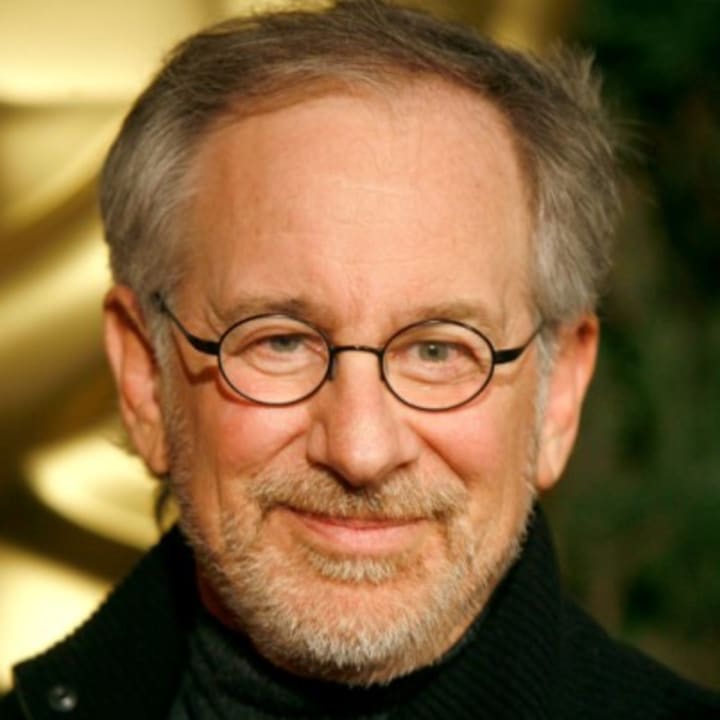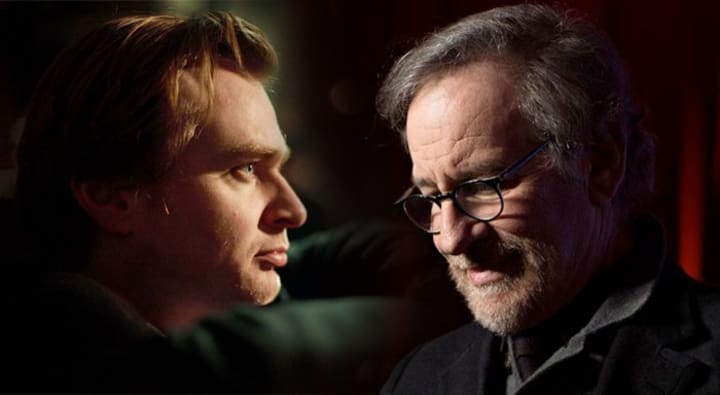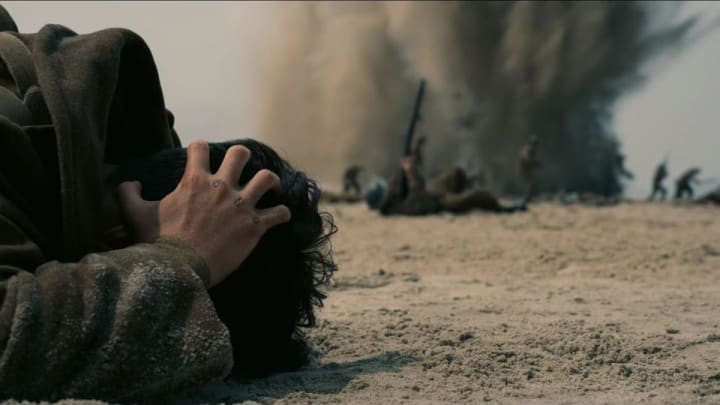Christopher Nolan Is the Spielberg of the 21st Century
Two of cinema's finest masterminds are more alike than you think.

In honor of the Oscar-nominated Dunkirk, which is written and directed by Christopher Nolan, I have decided to dive deep into shark infested waters to compare one of our generation’s most creative minds and compare him to one of cinema’s finest film-makers, Steven Spielberg. Christopher Nolan is not of the caliber or status of a Steven Spielberg quite yet but the potential is certainly there and has been there since his big screen debut in 1998’s Following. Now, even though you’ve probably already come into the article with steam coming out of your ears, your blood boiling, and the words, ”Nolan is overrated and will never be Spielberg” prepared, hear me out. Christopher Nolan has certainly taken the modern day cinematic landscape by storm and that cannot be ignored. Nolan continuously has new ideas swirling in his head that are ripe for the big screen, and will spend years studying the next film he is tackling or will tackle down the line. Nolan is dedicated, ambitious, creative, and crafts unique works time and time again, and it reminds me of the younger version of Steven Spielberg. Two directors who have become such big household names through their ability to insert their audience into the worlds they create, and directing us on these paths to go on a cinematic journey unlike anything we’ve seen before. There isn’t anyone quite like Spielberg, but Nolan has taken a very similar approach to his filmography and it is paying off in dividends and that is one of the many reasons why I believe Christopher Nolan is the 1970-2002 version of Steven Spielberg reincarnated.

I honestly believe that when looking at Spielberg’s earliest parts of his filmography and Nolan’s (nine feature films) alongside that we see very similar approaches to direction. While Nolan certainly approaches his films with a writer and director’s mindset, whereas Spielberg is more director based in his efforts, each director’s films have one thing very much in common. Their movies beg to be seen on the big screen as quickly as possible. This is where the foundation of my argument ultimately lies, Nolan and Spielberg are alike in this way and that is what Nolan reminds me of when I think of Spielberg in his prime. I wasn’t alive when a movie like Jaws released, but when discussing the release with my parents they told me that everyone was afraid to go into the water because of what Spielberg managed to capture. They told me that it made them second guess even putting a foot into the ocean water, and Nolan has that ability as well. Nolan hasn’t made a film that makes us question what lies in the depths of the ocean, but he’s made films that make us question our own reality, the ability to dream, and discovering new planets in the far reaches of outer space. These are two filmmakers that manage to find a way to elevate the movie going experience every time and have the ability to transport us alongside new characters and participate in new stories and live in new worlds. So when an upcoming release with the name “Christopher Nolan” or “Steven Spielberg” are plastered all over the marketing, you know you have to witness their work as soon as possible, in the biggest format, and with a packed audience taking in the spectacle that they have placed on screen.
There aren’t any filmmakers in my eyes that have quite achieved that status like Nolan has in this era of filmmaking. People like to argue and contend that Michael Bay is ultimately the savior of the theater going experience considering his Transformers franchise rakes in so much money during its run at the box office. This argument has always baffled me considering that I’ve seen most of Bay’s Transformers flicks as insults to the movie going experience and would argue that it’s a director like Nolan that understands, appreciates, and cherishes the experience of movie going. There is something about walking through those double doors to see “A Film by Christopher Nolan” on the big screen, and that feeling is likely reminiscent of those who went out in droves to see the words “A Film by Steven Spielberg” again and again. Obviously Spielberg is still directing today and continues to churn out project after project, but his films of the 21st century don’t quite compare to the work he produced in the 20th. People still make time to see the next Spielberg film, but his films of late lack that magic that he once sprinkled over every film he put out. Many people would claim that Nolan takes himself too seriously and doesn’t allow his movies to have any fun, but I beg to differ. When I see a movie like Interstellar or Inception specifically, I see a director pouring every ounce of hard work and passion he has for each respective project. It’s almost as if Nolan approaches every film as if it were his last and wants to make sure that each one gets the respect, care, and love it deserves. I don’t know many directors that would spend five to six years of their life studying the sciences of interstellar travel to prepare for a movie the caliber of Interstellar while still directing and writing three other films during that time.

In an interview with The Hollywood Reporter on January 3, 2015, Nolan received this question: “Did you go to the movies when you were a kid, and if you did, were there films or filmmakers that you were especially fond of?” To which Nolan replied, “I went to the movies a lot as a kid. That first Star Wars, that George Lucas directed, came out in 1977 when I was 7 years old. It made a huge impression on me, in terms of the scope of it and the idea that you could create an entirely different experience for the audience, literally any world, more than one world, a whole different galaxy. They also re released Kubrick’s 2001 when I was 7, so I got to see that on a huge screen, and it was really a thrilling experience. I don’t remember being remotely concerned about what it meant or whether it was elusive or confusing; I just remember the visceral nature of seeing spaceships, seeing other worlds and being taken to other dimensions. That experience was huge for me.” It’s in this quote where I see exactly who Nolan is as a filmmaker and why his films really do appeal to such a worldwide audience. As I’ve mentioned before, Nolan really does create an entirely different experience every time he’s made a movie this far into his career. We’ve been whisked away to so many new worlds, met so many new characters, and been involved in some of this era’s finest stories put to screen, and that’s exactly what Spielberg accomplished as well for just over 30 years. Nolan even mentions in another interview how a movie like Spielberg’s Close Encounters of the Third Kind really spoke to him about the potential of what movies can do in terms of taking an audience on an adventure. So the inspiration from such a prestigious talent like Spielberg has definitely made an impact on Nolan ever since he was a young boy. From the interviews you can find with Nolan you can definitely see how his inspirations have transferred over into his own work and even when he isn’t speaking in interviews you can see how Nolan is following a similar path that Spielberg did.
Spielberg never really tackled a franchise outside of the Indiana Jones trilogy, and Nolan the same with the exception of The Dark Knight trilogy. Each filmmaker took a crack at genres they have yet to explore, meshing genres, and exploring eras of history in ways we may have never seen before. They are filmmakers that implement their own sensibilities as directors but craft unique tales every single time thus making every experience with that director feel like a new one. Whereas most high profile directors today can’t help but give their films an overdose of their style and making every one of their films in their filmography feel similarly to the last. When I see a movie like Memento and then look at a movie like The Prestige, I see similar sensibilities in how Nolan is able to inter-cut and edit his stories in conveying the art of misdirection, but you’re getting an entirely new experience both times. This happens because Nolan, as mentioned, has the ability to keep us involved in his stories, as if we’ve never been in that time period before, and allows the film to envelop us in it’s narrative. Spielberg is a master at this as well and I’m not sure if there are many other directors like them that have such diverse filmographies and have that similar ability every film to make each experience feel unique to the last. Maybe when we look at filmmakers like the Coen brothers and Paul Thomas Anderson, but they don’t quite have the commercial status that a Nolan does in this modern age of cinema. Outside of Spielberg’s 32 year rampage of continuously producing high quality films that garnered endless acclaim and ridiculously high box office returns, no other director has quite measured up to that level of commercial, financial, and critical success. That is until Nolan jumped onto the scene with a rebooted Batman film, Batman Begins, being his step into the spotlight and thus changing his future in this industry forever. Jump forward 12 years later and now Nolan has tackled his first film in the war genre with Dunkirk, and it just so happens to be the film that got Nolan his first "Best Director" nomination in his career.

Eight months removed from the theatrical release of the film it still surprises me just how much of a powerful impact it left on me as a viewer. Being the big fan of Nolan that I am, none of the trailers impressed me or got me excited for the film. What I experienced in IMAX was nothing short of an unforgettable experience and Dunkirk is one of his best films yet. The ability he has to take the audience on such an exhilarating ride onto the beaches at Dunkirk is unbelievable considering he’s been doing it since Memento. Delving into the special features on the Dunkirk blu-ray will show you all of the hard work, passion, and care Nolan and his crew took in honoring those who survived the events at Dunkirk, and the astounding amount of respect Nolan has for the material. He went as far as tossing oil into the water as scenes were being filmed, and you can see why the Academy wanted to recognize his work by just watching the special features alone. Now, Dunkirk has drawn many comparisons to Steven Spielberg’s Saving Private Ryan, but they really aren’t alike at all. Both are tremendous cinematic achievements, but the director’s approach towards their movies are drastically different. In Saving Private Ryan we don’t really experience the events, but we witness them. We are looking at these events over the shoulder of these soldiers, but what we get in Dunkirk is a very different experience all together. Unlike Private Ryan where we witness those events, in Dunkirk we experience them as if we were a soldier in those scenarios. It’s unlike anything the genre has seen in this age of film-making and I’d be astonished to see anyone try and replicate what Nolan has accomplished here. As I’ve mentioned ad nauseum throughout this article explaining how Nolan cherishes the theater going experience, he puts it on full display in Dunkirk. Dunkirk is an experience and further cements my argument on why Nolan is practically a modern day replicant of the late 20th century Steven Spielberg. Dunkirk and Saving Private Ryan are both films I saw on the big screen and both times I found myself blown away at what the directors achieved through the experience they were able to give me as a viewer. Through each director’s war films we see how each film showcases what both of these directors do best, and that’s what forces you to see their films in the biggest and best format. Not to mention that the films themselves are incredibly well made in front of and behind the camera.
At this point I hope you’ve cooled off and are no longer painting that target on my back. I love Steven Spielberg, I love Christopher Nolan, and most importantly, I love the experiences they bring to the big screen. Spielberg was a nifty craftsman who took the landscape by storm with repeated hit after hit. As time grew on he became overrated to many and his prestige fell after his last truly great film in Catch Me If You Can in 2002. Nolan is following a similar path, not only in the way he approaches his filmography by tackling different types of films, but in how many have responded to the British director. Nolan has faced countless criticisms, some warranted and some not so warranted, not only towards him and his projects but his colossal fan base as well. We haven’t seen a following for a director this size since Spielberg’s name reigned supreme in cineplexes around the globe. What Nolan has done to keep the theater going experience alive and well is by following in the footsteps of one of the greatest filmmakers to ever touch an Arricam LT. By following this path of success we are seeing theaters flooded with viewers young and old flocking out to see Nolan tackle deep space or war torn France that we haven’t seen in years. Nolan is a game changer, and ever since The Dark Knight it’s been Christopher Nolan’s throne and everyone else is just fighting for that spot. You can exclaim that Nolan is a hack and can’t even sniff what it’s like to be considered a “true auteur,” but we are witnessing history repeat itself through the works of Christopher Jonathan James Nolan.
About the Creator
Roman Arbisi
An aspiring film critic/journalist. I've been writing movie reviews as a hobby since July 2015 in hopes of one day finally being known as a professional film critic. You can find all of my movie reviews at the Showtime w/ Roman blog.






Comments
There are no comments for this story
Be the first to respond and start the conversation.